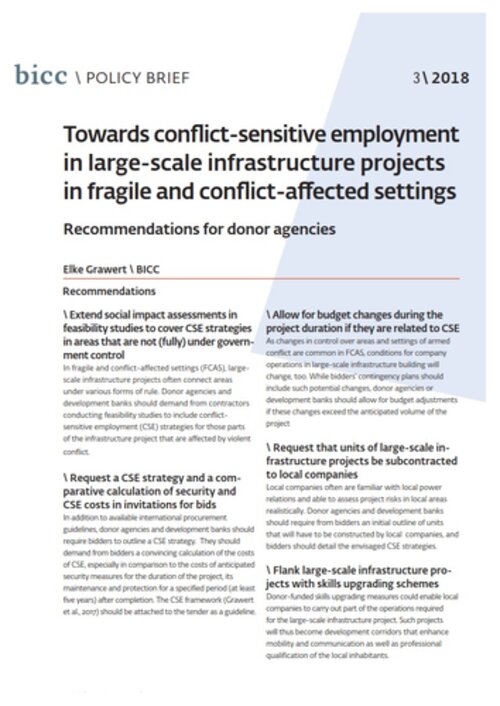Publications
Towards conflict-sensitive employment in large-scale infrastructure projects in fragile and conflict-affected settings: Recommendations for donor agencies
Release Date
2018-04
Language
- English
Topics
- –
In BICC's recent Policy Brief “Towards conflict-sensitive employment in large-scale infrastructure projects in fragile and conflict-affected settings”, Elke Grawert, based on intensive discussions with owners, managers of construction and transport companies as well as employees and workers, stakeholder workshops with donor and development agencies, development banks and chambers of commerce as well as academic experts on Afghanistan, outlines the following recommendations:
\ Extend social impact assessments in feasibility studies to cover CSE strategies in areas that are not (fully) under government control
In fragile and conflict-affected settings (FCAS), large-scale infrastructure projects often connect areas under various forms of rule. Donor agencies and development banks should demand from contractors conducting feasibility studies to include conflict-sensitive employment (CSE) strategies for those parts of the infrastructure project that are affected by violent conflict.
\ Request a CSE strategy and a comparative calculation of security and CSE costs in invitations for bids
In addition to available international procurement guidelines, donor agencies and development banks should require bidders to outline a CSE strategy. They should demand from bidders a convincing calculation of the costs of CSE, especially in comparison to the costs of anticipated security measures for the duration of the project, its maintenance and protection for a specified period (at least five years) after completion. The CSE framework (Grawert et al., 2017) should be attached to the tender as a guideline.
\ Allow for budget changes during the project duration if they are related to CSE
As changes in control over areas and settings of armed conflict are common in FCAS, conditions for company operations in large-scale infrastructure building will change, too. While bidders' contingency plans should include such potential changes, donor agencies or development banks should allow for budget adjustments if these changes exceed the anticipated volume of the project.
\ Request that units of large-scale infrastructure projects be subcontracted to local companies
Local companies often are familiar with local power relations and able to assess project risks in local areas realistically. Donor agencies and development banks should require from bidders an initial outline of units that will have to be constructed by local companies, and bidders should detail the envisaged CSE strategies.
\ Flank large-scale infrastructure projects with skills upgrading schemes
Donor-funded skills upgrading measures could enable local companies to carry out part of the operations required for the large-scale infrastructure project. Such projects will thus become development corridors that enhance mobility and communication as well as professional qualification of the local inhabitants.
PDF-Download
BICC_Policy_Brief_3_18.pdf
[English] (187.41 KB)

Cite as
@techreport{Grawert2018,
author = "Elke Grawert",
title = "Towards conflict-sensitive employment in large-scale infrastructure projects in fragile and conflict-affected settings: Recommendations for donor agencies",
latexTitle = "Towards conflict-sensitive employment in large-scale infrastructure projects in fragile and conflict-affected settings: Recommendations for donor agencies",
publisher = "BICC",
number = "3",
institution = "BICC",
type = "BICC Policy brief",
year = "2018",
address = "Bonn",
}
Document-Type
BICC Policy brief
Publisher
BICC
Place
Bonn
Countries/Region
Afghanistan



